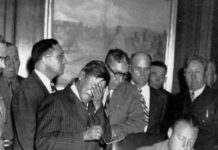It was in 1974 that the news broke. Chief Bolarinwa Abioro, the Balogun of Ipokia, the Chairman of African Songs Limited, had taken his star musician to court! Everyone who knew KSA knew Abioro. Everyone who knew Abioro knew Sunday Adeniyi. Sunny was the son. Abioro was the father. What could have gone wrong between father and son?
KSA was the second artiste to be signed on to the stable of African Songs Limited. Ayinde Bakare was the first. Sikiru Ayinde Barrister was the third. Like most creative people, young Sunny Ade was more concern about his passion and less concern about the business aspect of music. His passion was to play music and to excel as a musician.
Please read The Gani Fawehinmi Series (1): When a Degree is not who you are by Ayodeji Ogunsola
It was enough that Abioro – one of the biggest men in the music industry at the time – was ready to promote him. They brought documents for Sunny and his band boys to sign. They called it a contract. It could have been called any other name for all that KSA cared. Won ni ko wa je saara, o ni ojo ti wonu ju. Se ata ni won ni ko mu wa ni, abi iyo.
You are invited to a free feast, you are complaining about the short notice, are they asking you to bring salt or pepper? Sunny Ade and his boys didn’t hesitate. It is doubtful if any of them read what the contract said. The most important thing was that they were going to become recording artistes. Sunny signed. His band boys signed. Everybody was happy.
The contract was for five years. However before its expiration, KSA had become a household name. His album, Challenge Cup, sold in excess of 500,000 copies. It was certain that King Sunny Ade was going to dominate the music scene for a very long time to come. African Songs Ltd knew a good product when it saw one. The management of the company didn’t wait for the first contract to expire before they brought a new contract.
The new agreement was carefully worded. KSA and his band boys agreed to perform and record exclusively for ASL for a period of five years. ASL had full copyrights to all compositions and recordings of Sunny Ade. ASL was entitled to the sole right of production, reproduction, and use of King Sunny Ade’s performance throughout the world.
That was not all. During the period of the agreement, KSA was prohibited from rendering any performance whatsoever to himself, any company or group of persons. The contract also stipulated that ASL had the option to renew the agreement at its expiration for a further term of two years or for any longer period. Sunny Ade had no such right.
That was not all. On the sale of every album which price was then fixed at N6.00, KSA and his boys were entitled to a princely sum of 20 kobo. Yes, you read that right. African Songs would go home with the remaining N5.80K. Onigegewura’s mathematics has never been good. He is just an amateur historian. You can do the sum yourself.
Still basking in the euphoria of his growing fame, Sunny gratefully signed again. His band boys signed. 20 kobo was still something. Orogun iya re da sokoto fun o, o ni ko bale, melo ni iya to bi o da fun o? You are complaining that the trouser made for you by your step-mother was not long enough, where is the one your own mother made for you?
They were expecting their 20 kobo royalty on every album. Well, when the time came for actual payment, it was then discovered that mathematically and arithmetically, it was not supposed to be 20 kobo. They had not factored the cost of publicity and promotion! And since it was the artiste that was being promoted, he must be the one to bear the cost! After the addition and subtraction, Sunny was given 15 kobo per album.
KSA was not Chike Obi, the mathematician. But he knew that 20 kobo and 15 kobo were not the same thing. Compared with his contemporaries in the music industry, KSA realized that he was holding the short end of the stick. His colleague, Baba Commander, Chief Ebenezer Obey was earning as high as 70 kobo per album. Others were earning between 35 kobo and 60 kobo.
That was when Sunny decided to ask Chief Abioro for a raise of the royalty payment. The chairman listened patiently to KSA and his colleagues. He was nodding as they canvassed one reason after another why a raise was in order.
When they finished, Chief Abioro flipped open a file he had on his table. He brought out a bundle of documents. Even from where he was seated across the table, Sunny saw that it was a copy of the contract he signed. ‘An agreement is an agreement. It is a binding contract!’ The chief informed them. ‘This is what you signed. This is what you are entitled to! No more, No less.’ He returned the documents to the file. Case dismissed.
But Sunny was not done. ‘Chief, this is not about contract. You are our father. Our request is for adequate compensation! Let’s leave the contract aside.’ Chief Abioro looked at the young star the way a parent looks at a child asking for another candy. ‘Leave the contract aside? We should leave the contract aside?’ The chairman asked incredulously. ‘You know, it would be nice to leave the contract aside. But you know what? That would be illegal!’
Haba! Illegality ke! It was then that someone brought up the idea of requesting some of his friends to plead their case. Sunny agreed. After all, Eni ti o mo oju Ogun, ni pa obi ni‘re. It is the person who is conversant with Ogun, the god of iron that is usually given the duty to administer its rites.
They went to meet Prince Okunade Sijuwade who would later become the Ooni of Ife. They also met with Chief Afolabi Joseph. Even Chief Ebenezer Obey was also requested to intervene as well as Chief Nurudeen Alowonle.
The eminent persons appeared in the court of the Balogun of Ipokia as ‘amici curiae’ on behalf of the musicians. Amici curiae are lawyers invited by the judge(s) to assist in filling briefs that may be helpful to the court in deciding a case. Our eminent persons argued their case like experienced advocates.
They cited relevant sections of the unwritten Yoruba constitution. They cited Yoruba proverbs. They made reference to the story of Oduduwa. The presiding chairman listened to their submissions and summarily dismissed the case. Contract is contract!
Chief did not only dismiss the request for a raise. He opened another file on his table and brought out a new set of documents. Your guess is right! A new five-year contract!
By now, Sunny Ade had learnt enough law. He had become a professional mathematician. He had obtained his Master of Business Administration from practical experience. He knew the implication of putting pen to paper. He applied for an adjournment.
The King of African Beats found himself in a quandary. His new songs were ready but Chief had threatened not to release any new album until he signed the new contract. And KSA was not ready to sign any new contract until the issue of royalty was resolved.
KSA remembered his grandmother’s proverb. Ti abiku ba gbon ogbon ati ku ni igba erun, iya abiku a gbon ogbon ati sin oku e si etido. If an abiku decided to die during the dry season when he knew that the ground would be hard to dig, his parents would also decide to bury him by the riverside where the ground would not be hard to dig.
Sunny Ade decided to release his record with another company. His plan was to use the album to bargain for a better deal with African Songs. Instead of the measly 20 kobo, he was confident that the chairman would be ready to pay him at least N1.00 per copy.
The album was recorded in Nigeria but taken to London for mixing. What Sunny Ade did not know was that Chief Abioro was a master at the game. Before Sunny could get a copy of his own album, Chief Abioro was already in possession of the new record.
Baba Ibeji was composing fresh materials at home when the court bailiffs arrived. They served him with an order of interim injunction! The court order was as comprehensive as it was broad. Sunny Ade was prohibited from sale, distribution, marketing, dealing, etc. etc. of the record. He read the order again. Even without being a lawyer, he knew the implication of the document he was holding.
With palpable emotion, his mind went back to how he came to Lagos from Abeokuta with only one shilling and eighteen pence! He remembered his years with Baba Sala. He recalled how he got stranded with Baba Sala’s travelling theatre in Jebba and Kano.
How he did not see his mother for two years whilst he suffered to make it as a musician. He recalled how his first album sold only 13 copies. Now when he was at the threshold of success, this court order! With grim determination, he knew he couldn’t afford to quit.
He remembered his first day at Oshodi when he missed his way trying to locate Moses Olaiya’s house and how he was directed instead to Dr. Victor Olaiya at Tinubu. He recalled how he knelt down in the dust of Oshodi to pray. Immediately he knew what he must do. Sunny went down on his knees and with an emotional voice, he prayed and prayed.
It was not the Sunday Adeniyi that knelt down to pray that stood up. He had become empowered. He had become emboldened. That same evening, he established his own label.
He didn’t bother to sit down again. He remembered the threat of Chief Abioro to bring him down at all cost. He needed a lawyer who knew his law and who would be prepared to fight his cause against the Magnate. He went off in search of Gani Fawehinmi.
To be continued.
Follow the Neptune Prime channel on WhatsApp:
Do you have breaking news, interview request, opinion, suggestion, or want your event covered? Email us at neptuneprime2233@gmail.com




